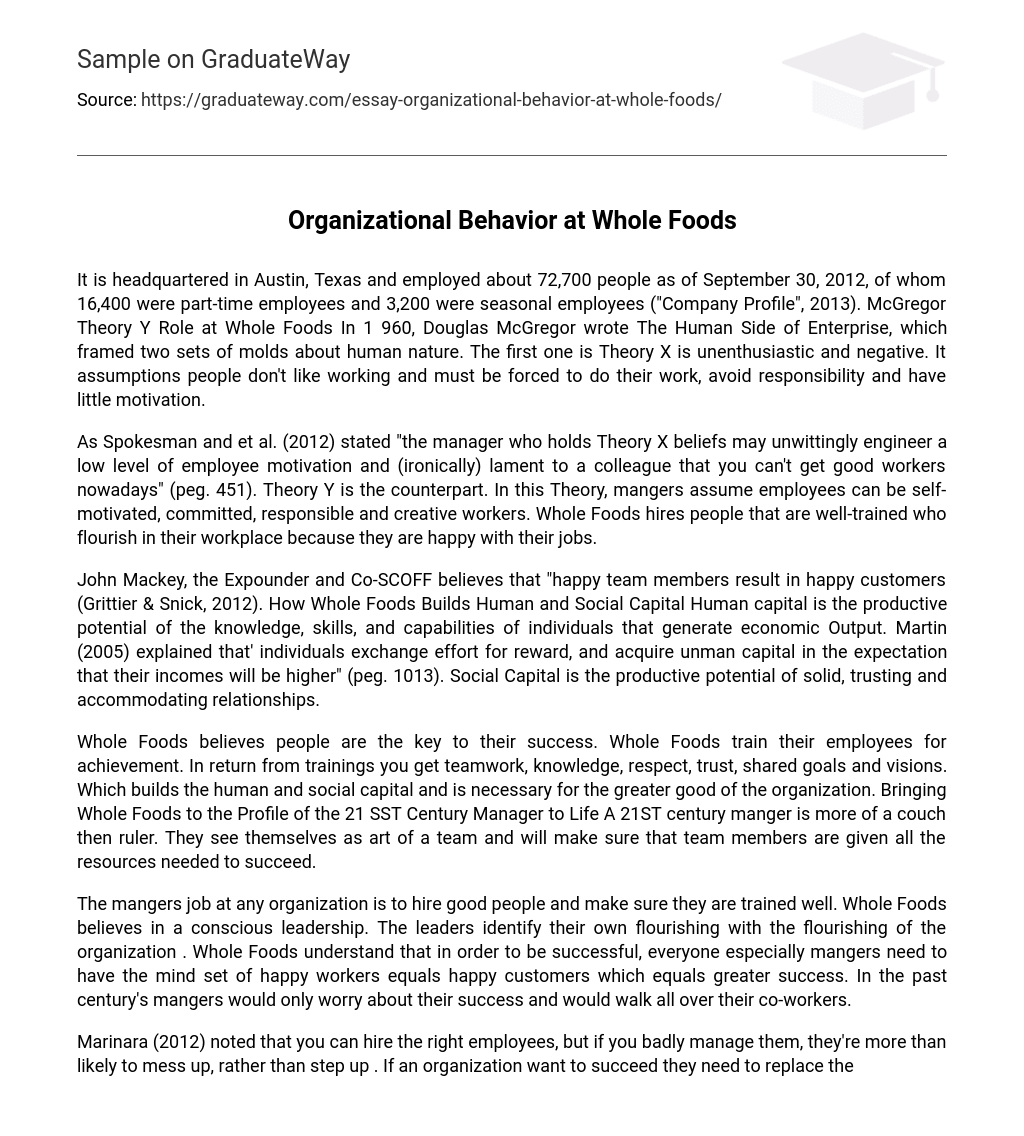It is headquartered in Austin, Texas and employed about 72,700 people as of September 30, 2012, of whom 16,400 were part-time employees and 3,200 were seasonal employees (“Company Profile”, 2013). McGregor Theory Y Role at Whole Foods In 1960, Douglas McGregor wrote The Human Side of Enterprise, which presented two contrasting views of human nature. The first one is Theory X, which is pessimistic and negative. It assumes that people dislike work and need to be coerced into doing it, shirk responsibility, and lack motivation.
According to Spokesman and et al. (2012), managers who adhere to Theory X may unknowingly create a lack of motivation among employees and subsequently express frustration to colleagues about the difficulties of finding good workers (p. 451). Conversely, Theory Y is the opposite approach, where managers believe that employees are capable of being self-motivated, dedicated, accountable, and innovative individuals. At Whole Foods, the company hires well-trained individuals who thrive in their jobs as they find fulfillment and satisfaction in their work environment.
According to John Mackey, the Expounder and Co-SCOFF, having happy team members leads to satisfied customers (Grittier & Snick, 2012). Whole Foods prioritizes the development of human and social capital. Human capital involves individuals’ knowledge, skills, and abilities that contribute to economic output. Martin (2005) argues that people exchange their efforts for rewards and aim to acquire human capital in order to attain higher incomes (pg. 1013). Conversely, social capital refers to the potential productivity of strong relationships based on trust and accommodation.
Whole Foods attributes their success to their employees, whom they believe are crucial. They offer training to foster teamwork, knowledge, respect, trust, and shared goals and visions. This training aids in developing human and social capital, which is vital for the organization’s overall well-being. In the 21st century, Whole Foods envisions managers as facilitators rather than authoritative figures who consider themselves part of a team and prioritize equipping team members with essential resources for success.
The role of managers in any organization is to recruit and effectively train competent individuals. Whole Foods embraces the concept of conscious leadership, wherein leaders correlate their personal growth with the success of the organization. Whole Foods recognizes that for overall success, particularly managers must embrace the belief that contented employees lead to satisfied customers and ultimately drive greater achievements. In previous decades, managers would solely prioritize personal success and display indifference towards their colleagues.
According to Marinara (2012), if you hire the right employees but manage them poorly, they are more likely to make mistakes instead of improving. Therefore, organizations that aim to succeed should replace ineffective managers. One way to determine if a manager is up-to-date in the 21st century is by asking their team members. Carol’s Global Corporate Social Responsibility pyramid at Whole Foods exemplifies the concept of corporate social responsibility, which entails moral, ethical, and compassionate obligations in addition to earning profits for investors and following legal regulations.
Barnett discussed the importance of adopting a wide-ranging perspective on organizational responsibilities in the context of CARS. This perspective should encompass various stakeholders, such as stockholders, employees, suppliers, customers, the local community, as well as local, state, and federal governments, environmental groups, and other special interest groups. In terms of Carol’s global corporate social responsibility pyramid, I would position Whole Foods at the top due to their commitment to both their community and the environment.
Whole Foods is committed to supporting sustainable agriculture, organic farmers, and the environment. They show their dedication through recycling, reusing, and reducing waste. Furthermore, they annually donate 5% of their profits to non-profit organizations and the community. Whole Foods values their trade partners as valuable supporters who serve their stakeholders. They treat them with equal respect, fairness, and integrity in return.
The Seven Moral Principles at Force at Whole Foods
Managers should aim to rely on moral principles in order to ensure that their choices are honorable, suitable, and defensible. All seven morals should be evident in every successful 21st century business. Whole Foods holds the fundamental beliefs of dignity of human life and autonomy. The organization acknowledges the importance of treating all individuals with respect, recognizing that every team member and customer possesses inherent value, dignity, and the right to self-determination. Honesty and fairness are deeply valued by the company’s managers.
Whole Foods values openness and believes in the right of everyone to be knowledgeable. They prioritize loyalty and view it as crucial for business success. Whole Foods aims to attract and retain employees, vendors, and customers who repeatedly choose their services. They embrace diversity, recognizing that it enhances their company’s identity and often fosters innovation through fresh perspectives. Whole Foods also prioritizes humaneness and the welfare of the community, demonstrated by their commitment to give back. They are pioneers in the retail industry, being the first major retailer to offset all of their energy consumption with wind energy credits.





